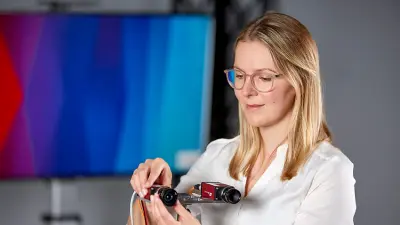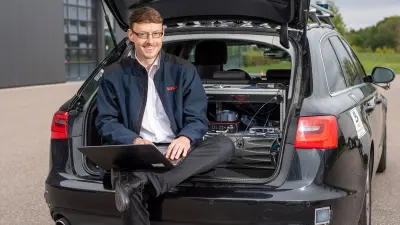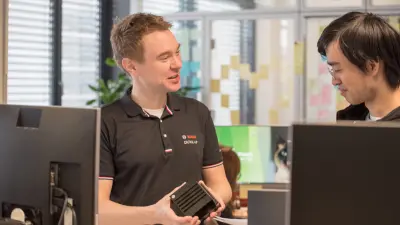Dr. Wan Ding
Senior Manager for Industry Automation System, Semantic Stack and Robotics, Bosch Connected Industry
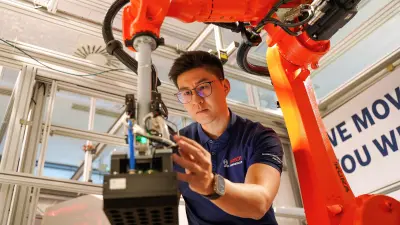
I work as Senior Manager and Head of the Department of Engineering Software at Bosch Connected Industry, China. Throughout my career at Bosch, I have focused on the domain of Industry 4.0, including Robotics, Industry Automation Systems, and Semantic Stack.
During my research time at Bosch Corporate Research since 2017, my research started and envisioned “Making Industrial Robots Smarter” with the help of computer vision, path and grasp planning, and robotic control. In the domain of flexible manufacturing, my automation team and I aim to develop a digital engineering toolkit, modular software architecture, and a dynamic process orchestration algorithm. To unlock the value of Bosch data by integrating meaningful data, my knowledge engineering team and I contribute the semantic conceptual models, knowledge graphs, and graph machine learning algorithms as the fundamental manufacturing knowledge.
To pursue further excellence in the field of smart manufacturing starting in 2024, I joined BCI China and I am leading a software development team that aims to deliver high-quality standardized software products and solutions to digitalize and improve the transparency of the whole manufacturing value chain, namely NEXEED and Bosch Semantic Stack.
Please tell us what fascinates you most about research.
What captivates me most about research is its profound potential to enhance and enrich the life of people. Whether it be pioneering breakthroughs or leveraging the insights of predecessors, research is fundamentally driven by the noble aim to find ways to continuously bring value to others and improve our lives. Moreover, research lets me understand the value of both patience and foresight. Research is about innovation and creativity, problem-solving, uncovering new possibilities, and making progress that benefits everyone. And that’s what truly excites me about delving into the world of research.
What makes research done at Bosch so special?
I really appreciate the openness and encouragement in Bosch for researchers to explore new technologies that are ultimately invented for life. Bosch focuses on research that directly translates into practical applications and solutions for real-world challenges and is deeply rooted in understanding and addressing customer needs. The research efforts are often driven by the aim to improve the quality of life, enhance safety, and promote sustainability. Bosch encourages interdisciplinary collaboration, bringing together experts from various fields such as engineering, computer science, materials science, and more. This holistic approach fosters innovation by leveraging diverse perspectives and knowledge. By prioritizing customer-centric innovation, Bosch ensures that its research efforts result in products and services that meet the evolving demands of consumers and industries. With a global presence and a network of research and development centers around the world, Bosch has access to diverse talent resources that enables the company to leverage local expertise and insights while tackling global challenges.
What research topics are you currently working on at Bosch?
Based on the BCI products, including NEXEED (Automation and Industrial Automation System (IAS)) and Bosch Semantic Stack, my team and I are currently working on creating a modular and lightweight software solution that facilitates seamless interactions among Large Language Modules (LLMs), Digital Twins (Aspect Models and Knowledge Graphs), and NEXEED IAS modules.
What are the biggest scientific challenges in your field of research?
In the domain of smart manufacturing, we are dealing with scientific challenges in many aspects. For the robots, we face the challenges of how the objects with different material types, colors, and geometric shapes can be identified, positioned, picked, and placed nicely in the required posture by the industrial robots, how the mobile robots can understand the working environment and reason the task logic and path to execute a command in an explainable way. For flexible automated modular production, we need modular software architecture for low-effort reconfiguration and reusable modularity, virtual software commissioning for fast process and cycle time validation, optimization algorithms for best station layout, dynamic process orchestration for variable process flow and dispatching of robot and human, etc. For digitalization, we tackle the challenge of how to make the LLMs speak accurate Bosch language in the manufacturing domain and how to explore a new way of efficiently utilizing and interacting with our industrial automation system modules and digital twin systems with the integration of foundation models.
How do the results of your research become part of solutions “Invented for life”?
We are developing a vision-guided robotic bin-picking system that improves efficiency and releases human operators of repeatable work. The flexible manufacturing system that shortens the time to market and solves fast iterations reduces the overall production cost, which will benefit the end customers. The digital twin system that enables full transparency of product lifecycle data will shorten the overall decision-making process and response time for solution users. We will continue to guide our research to fulfill the slogan of “Invented for life”.
Curriculum vitae
Since 2024
Head of Department Engineering Software, Bosch Connect Industry, China
2022
Senior Manager of i4.0 for Semantic Stack, Automation System, Robotics, Corporate Research, Bosch China
2021
Senior Expert of Robotic Manipulation, Corporate Research, Bosch China
2019
Team Leader & Project Manager, Corporate Research, Bosch China
2017
Senior Research Scientist for i4.0 & Robotics, Corporate Research, Bosch China
2015
Post-doc and Research Fellow, Institute of Mechanism Theory, Machine Dynamics and Robotics (IGMR), RWTH Aachen University (Germany)
2009
MSc and Ph. D. in Robotics and Design Theory, Beijing Jiaotong University (China)
2005
BSc in Mechatronics Engineering, Hubei Polytechnic University (China)
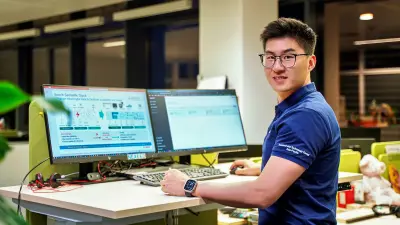
Selected publications

Heng, et al. (2023)
- Heng Xiong, Kai Ding, Wan Ding, Jian Peng, Jianfeng Xu
- Advanced Engineering Informatics, Volume 57

Wei, et al. (2019)
- Wei Wang, Zhuoqi Zeng, Wan Ding, Huajun Yu, Hannes Rose
- 2019 IEEE/RSJ International Conference on Intelligent Robots and Systems

De La Cruz, et al. (2019)
- Jorge De La Cruz, Wan Ding, Mathias Huesing, Burkhard Corves
- Advances in Mechanism and Machine Science: Proceedings of the 15th IFToMM WC 2019, Mechanisms and Machine Science, volume 73

Wan, et al. (2018)
- Wan Ding, Tim Detert, Jorge De La Cruz, Burkhard Corves
- 2018 IEEE International Conference on Robotics and Automation (ICRA)
Get in touch with me
Dr. Wan Ding
Senior Manager for Industry Automation System, Semantic Stack and Robotics, Bosch Connected Industry
